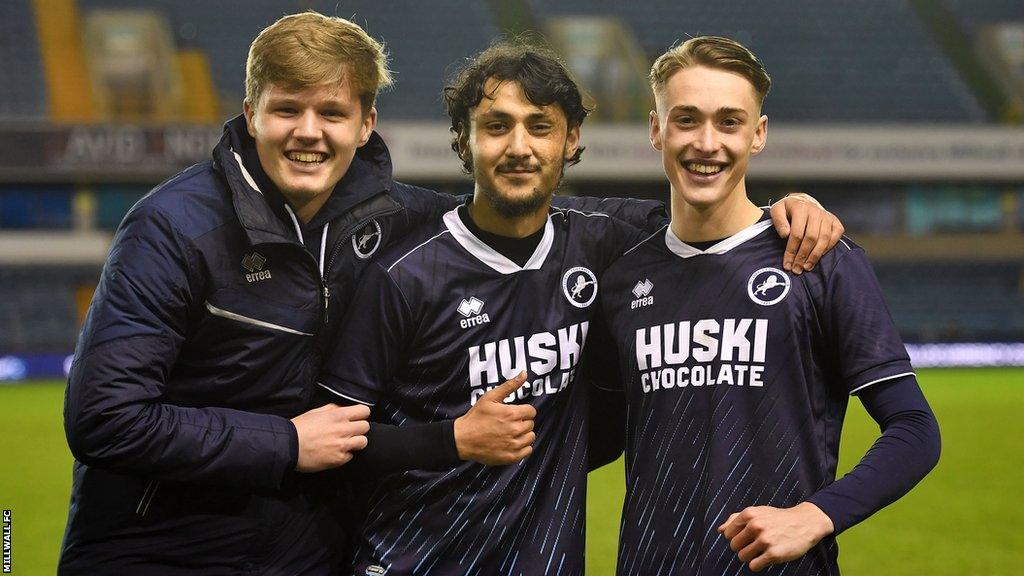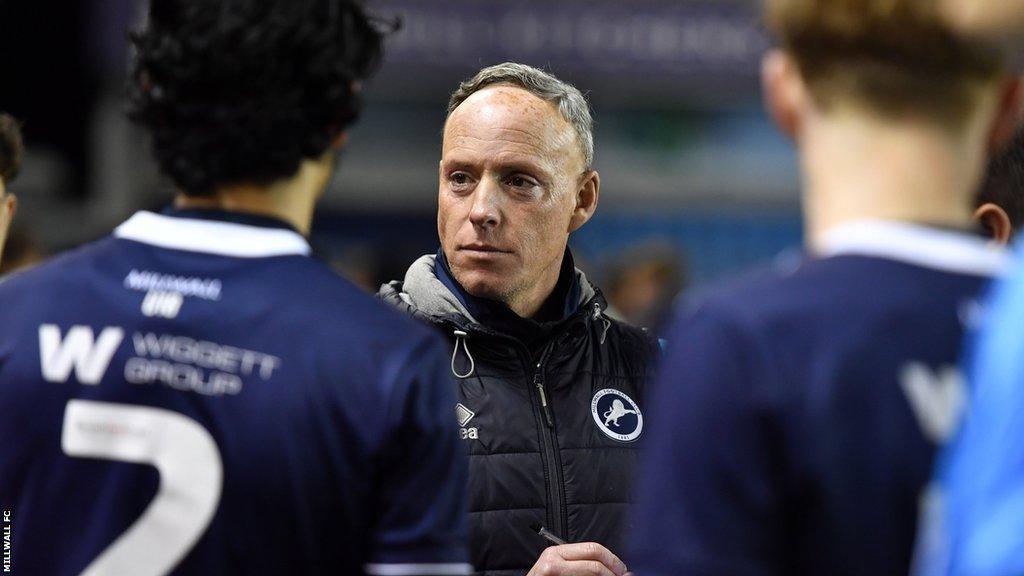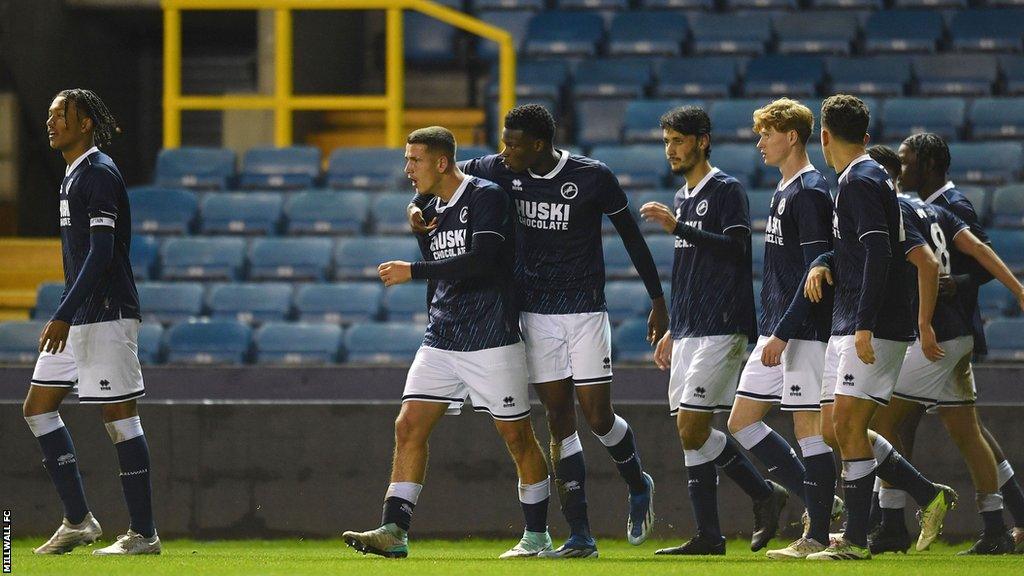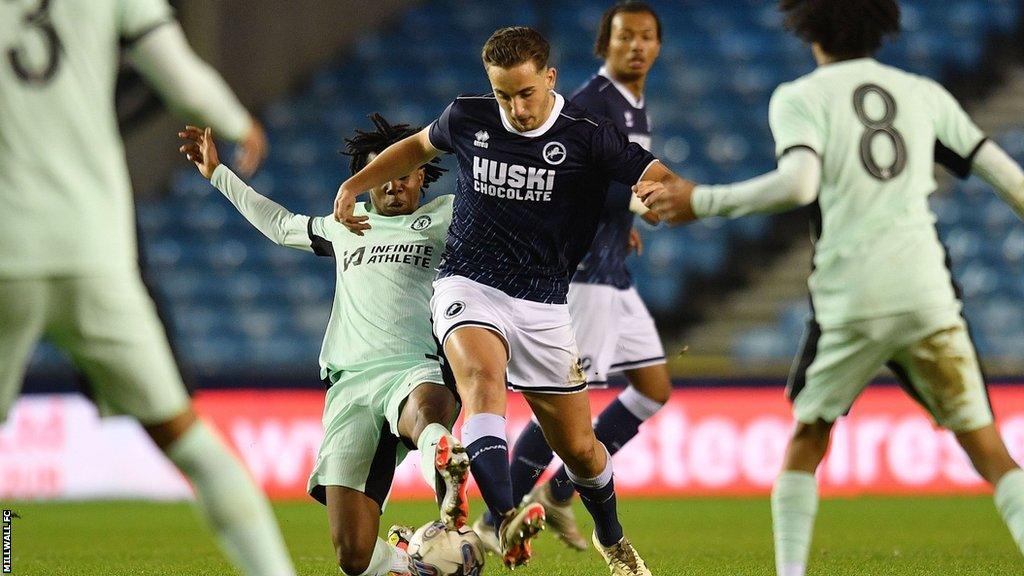FA Youth Cup: Can Millwall continue beating odds at semi-final stage?
- Published

Millwall are aiming to become the first EFL club since Ipswich Town in 2005 to win the FA Youth Cup
London has a strong recent FA Youth Cup record.
West Ham are the current holders, lifting the trophy after beating Arsenal at Emirates Stadium.
Chelsea reached seven finals in a row, winning six, during an unprecedented period of dominance between 2012 and 2018.
It's therefore no surprise the capital is represented in the semi-finals this season, but the team involved may raise eyebrows.
Millwall do have history. Youth Cup winners in 1979 and 1991, if they go on to become the first English Football League side to win the country's most prestigious youth tournament since 2005, they will equal Manchester City, Everton and Tottenham with three triumphs.
Yet, in an era where a dozen scouts, many from the bigger clubs, regularly watch their under-nine games in the increasingly competitive search for talent, it was a significant achievement when the Lions beat Chelsea on penalties to book a last-four meeting with fellow Championship club Leeds at Elland Road on Thursday, when a huge crowd is expected.
"The academy system now is different to 10 years ago," said Millwall's under-18 coach Larry McAvoy.
"Arsenal, Chelsea and Tottenham are recruiting from under-eights, even in our area. It is really competitive.
"We can't offer the same facilities as some of the bigger clubs but we are really good at giving players game time and opportunities they may not get elsewhere. We feel like we treat them really well. At times, when the bigger clubs have come in, we have had to take the offer, but we have been able to retain a lot of our better players."

McAvoy has worked for Millwall for more than a decade, going from coaching the under-nines to managing the under-18s squad
Pride of Lions
McAvoy has been with Millwall for more than a decade, working his way up from coaching the under-nines. He shares his duties with Chris Perry, who made 583 senior appearances in a career most notable for long spells at Wimbledon and Tottenham.
Perry joined Millwall's coaching staff in 2015, while academy director Scott Fitzgerald is a former Lions player who returned in 2007.
The longevity is significant at a club where positive headlines can be hard to come by, and stereotypes difficult to shift.
"You never get to know the real club until you are in it," said Fitzgerald. "People will only see and read what they want but until you actually come to a game on a Saturday, or come to the training ground for a trial, you don't know.
"I am now in my 17th year in this job. I had five years here as a player. Millwall is a huge part of mine and my family's life. It is so close to my heart. I am very protective about everything to do with Millwall - the players, the fans, the parents. I know most clubs would say this but all the staff, not just the technical ones, are the best people."

Millwall were one of three Championship clubs to reach the FA Youth Cup semi-finals - Bristol City and Leeds being the other two
Beating the odds in youth recruitment
Millwall were joined in the last four by fellow category two academy Bristol City, who were beaten by Manchester City in Tuesday's semi-final. They, like the Lions, simply cannot afford the additional millions it would take to push for elite category one status.
It is naive to believe finances do not play a major role at youth level, which is why Fitzgerald puts such emphasis on the human side of player development.
"People are spending a lot of money on recruitment," he said. "When I started 17 years ago, everyone was aware of recruitment but not to the extent they are now. At every game you play, at no matter what age groups, from under-nines to under-21s, there are scouts from 10 clubs. And it's not just Millwall. It's everyone. Ten years ago it would have been a handful of people.
"I might be sounding a bit old school, but some of my best times growing up were playing with my mates. You might lose that by being at an academy so many times a week at that age. I still think it is really important kids spend time with their friends and play with them.
"Our job is to try and give them as many experiences as we can. But, whatever we try, I don't feel we can create the friends one."

Millwall beat nine-time winners Chelsea on penalties in the quarter-finals of this year's competition
Contract decision time looms
Nevertheless, Fitzgerald says he "loves being in this dogfight to try and get the next player", particularly when it comes to what he describes as the "healthy rivalry" with neighbours Charlton and Crystal Palace. Nurturing young talent, he says, is "hugely rewarding".
"And it is not just the guys who make it," he said. "It is the ones who go on to be policemen, lawyers, work at a bank. We are playing a part in their whole future. Obviously the guys who end up playing at The Den, that moment they walk out is something that is difficult to describe. It is a proud, father-type feeling.
"That said, I struggle to really enjoy the moment. I would like it to be different but I just can't. Within 15 minutes I am thinking: 'Who is the next one?'"
It is more than a job to Fitzgerald and, as will be the case at most academies, he is gearing up for the most difficult conversations - telling players they are being released.
The semi-final at Leeds will provide a unique opportunity to assess performances in front of the biggest - and likely most hostile - crowd Millwall's youngsters will encounter, with the pressure and the potential rewards at their greatest. It is not unfair to say careers could stand or fall on what happens.
"This is an extreme case," he said. "The team is really important but I will still be analysing the players individually, trying to think ahead about who is going to have a chance, who is going to get to the next contract.
"That decision-making is not the best part of the job, that's for sure. We have collective discussions and a series of meetings over a period of time but ultimately, the person who has to give them the decision is me."

Who are the new Posh & Becks? Join Lily Allen and Miquita Oliver for your weekly dose of unfiltered chit chat!
A dying plea to 'find the real killers': Annette Hewins was wrongly accused of arson with the intent to endanger life
